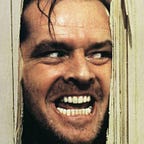Movie Review: Pyewackin’ It — I’m Just a Kid, and I’ve Turned My Life Into an Even Bigger Nightmare
For our next horror movie discussion, I would like us to contemplate the niche but still engaging movie of Pyewacket (2017), a movie my roommate turned me on to during one of our occasional, ritualistic movie nights where we fight tooth and nail over whose turn it is to suggest the next movie.
You heard me right. At first, I didn’t think I myself had heard the title properly either. I distinctly remember asking my roommate “‘Pie WHACK-IT’? What sort of lewd film are you trying to drag me into?!” to their absolute utter unamusement. But you know what? Dumb naming scheme aside, this was a pretty damn good film! Not only did it incorporate a realistic, sinister supernatural force, it also included a gratingly intimate perspective of a newly widowed mother and her struggling relationship with her single adolescent daughter, a psychological circumstance the film did a great job of portraying genuinely. If there’s one thing I appreciate about good horror films, its the implications on human nature, and this film holds no punches exploring how a domestic environment can sour when the emotionally available parent ambiguously leaves the picture.
What was disturbing to me about this film wasn’t the arcane and stupidly-named force of evil main character Leah Reyes summons to punish her grieving mother for her selfishness, it was the situation that compelled Leah to act out against her mother and perform such a ritual. Through unexplained means, the father of the house met with an untimely demise, leaving young Leah with her emotionally distant (and admittedly bitchy) mother. Feeling like she’s “at [her] father’s funeral” by staying in Leah’s childhood home, the mother impulsively decides to move an hour away without Leah’s consent, uprooting Leah from the vital support system of her hometown friends.
She feels powerless to her mother’s whim, which of course has already been greatly destabilized through a newfound alcoholism and the implied perception of Leah’s emotions being reflective of her poor parenting. As her mother encourages her to repress her own valid feelings for the sake of her own consciousness, Leah acts out in a different way. Utilizing her dabbling in the dark arts, Leah performs a ritual to summon a demon to kill her mother, giving us the eponymous name of Pyewacket.
Through the movie, Pyewacket’s presence becomes apparent, with Leah beginning to feel immense guilt as her mother’s demeanor does a 180*, suddenly turning her into an emotionally perceptive parent (while her daughter submits to her will, of course). This inevitably leads to Leah assuming Pyewacket has taken the form of her mother, leading to the horrifying ending of her lighting dear mommy alive on fire.
As a teenager who had my ups and distinctive downs with my own mother, it was hard to watch a girl suffering so personally be condemned by the plot in this movie. I understood the intention of her inevitably suffering for her act of malice, and I suppose the mother herself received just desserts for her own misbehavior, but it still feels disingenuous to the valid pain and anger Leah was harboring. Most horror movies come bearing a lesson to its viewers, and though this one was obvious, it still felt like a slight to the suffering of young women everywhere.
If Leah was punished for acting out towards the injustice she perceived herself being faced with, what message does that share to other young girls suffering silently under their own mantles? To not practice dark magic? Maybe so, but regardless, I think Leah deserved some justice in her own right. Perhaps the remaining bond between daughter and mother could have symbolically beaten the evil of unchecked grief Pyewacket represented, but of course, male horror directors are literal sluts for female suffering, and so their damnation was inevitable.
In all, Pyewacket, despite its flaws and clearly male-perception of female grief, is a good film that leans towards the psychological and domestic rather than mere supernatural. This, in my opinion, is what gives it more weight than other witchy-movies of the genre, showing us that these unrealistic evils have very human counterparts. So next time your mom pisses you off, instead of participating in an elaborate blood ritual out in the forest next to your new home, maybe take the time to communicate with her directly, or at the very least, wait until you’re an adult to process the trauma maturely.
